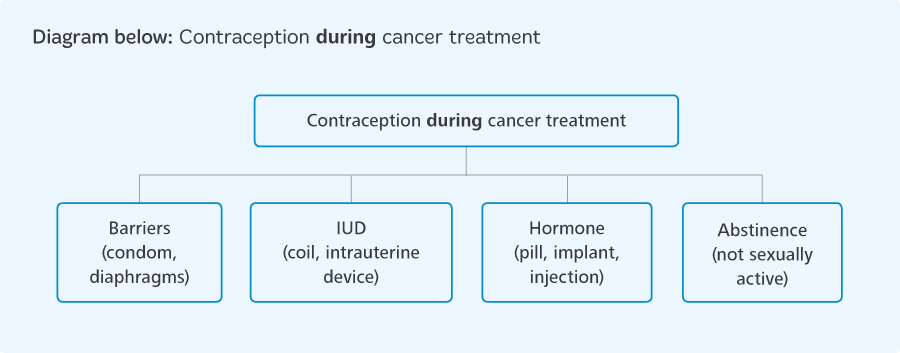Contraception during cancer treatment
Women are strongly advised not to get pregnant whilst having cancer treatment. This is because cancer treatments can damage an unborn baby at the early stages of development. Even if your periods stop during treatment, this does not mean you cannot get pregnant.
If you are sexually active, you should use a reliable contraceptive method throughout your cancer treatment. The diagram below shows the different types of contraception to consider.
It is recommended that women who are having hormone treatments, use non-hormonal methods of contraception. These include condoms, female condoms (Femidoms) and diaphragms. The contraceptive pill is less commonly advised for women with hormone sensitive cancers. This is because there is a chance that hormones in the contraceptive pill could stimulate any remaining cancer cells.
It is advised that you discuss these various methods of contraception with your cancer care team. They may refer you to a family planning clinic or your GP who can advise you further.
The following questions may help you talk with your cancer care team or GP about contraception:
- What contraceptive would be best for me during my cancer treatment?
- How long will I need to use this contraceptive for?
- Do I need to use non-hormonal methods of contraception for my cancer type?
- If I am not having a period during my cancer treatment, should I still use contraceptives?
- Will it affect me or my unborn baby if I choose not to use contraception and get pregnant during my cancer treatment?

Not all women who have cancer treatment will have a fertility problem. Some women may face permanent loss of fertility after cancer treatment. This can be upsetting and difficult to come to terms with. It might come at a time when a woman is planning to start a family or before a woman’s family is complete.
If this is the case for you, you may find it helpful to seek professional counselling. This may be available in fertility services from someone who is not directly involved in your fertility treatment. Other organisations which may be able to provide this dedicated counselling support have been listed here. As well as offering emotional support, they will be able to offer information on other options. These include surrogacy, adoption and fostering. They can advise on other methods of assisted pregnancies such as donor eggs and embryos or using your own saved eggs, embryos and ovarian tissue.
The HFEA website www.hfea.gov.uk has more information about egg or embryo donation and surrogacy.
The organisations listed here include information and support for people interested in fostering and adoption.










